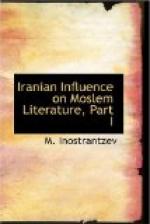[Footnote 1: See Noeldeke “National Epos” 13.]
[Footnote 2: See Part II.]
The list of Persian subjects comprised in these Arabic books afford us a sufficient idea of the wealth and variety of the material on these points to be recovered from Arabic discourses on manners and morals.
CHAPTER VII
The Book of Ali Ibn Ubaida ar Raihani
PAHLAVI RUSHNAI NAMEH.
We spoke above about the Arabic writer Ali ibn Ubayd ar Rayhani who was prone to Persian cultural tradition in general and to the literary tradition in particular. Besides the ethico-didactic book, Mehr Adar Jushnas, he is the reputed author of a book on Adab which has a Persian title (Fihrist 1, 119, 22 and II, 52),[1] and also another book the title of which could not be deciphered by Flugel when he edited the text of the Fihrist, (Fih. 119, 21). The title consists of two words which can be read conjecturally as Rushna nibik.[2] Such a name of a book we know to exist in Middle Persian literature.[3]
[Footnote 1: Kitab Adab Jawanshir].
[Footnote 2: As regards the mutilation of Persian proper names in the Fihrist, such comparatively wellknown books as Khuday Nameh appear in some of the manuscripts of the Fihrist as Baktiyar Nameh instead of bakhuday Nameh; see Rosen’s essay on the Translations of the Khuday Nameh, 177.]
[Footnote 3: West; Sacred Books of the East Vol. V. page 241, note 1, and Sacred Books of the East Vol. III, 169. [The first authority is not quite clear to me. The second authority is evident: “writing which the glorified Roshna, son of Atur-frobag, prepared—for which he appointed the name of the Roshan Nipik.” Tr.] Re the name of Rushen see Justi Namenbuch 262 under the word Rozanis.]
* * * * *
Books of this title in Pahlavi literature related to a variety of religious problems and treated of ethicodidactic themes. The same title, further, we find in the Middle Persian literature. This is the title of the wellknown book of Nasir-i-Khusrao, namely, Rushnai Nameh, a considerable portion of which manifests Shia and Sufistic influences and which by its nature must have been connected with ethico-didactic literature.[1] It is quite possible that Ar Rayhani interested himself in Persian of ethics and morality literature and in Persian Adab and gave his book the name of the ‘Book Light’ which treated of questions of this nature. This book formed, as no doubt its author did, the uniting link between the didactic Parsi clerical writings and the ethical literature of Islam.
[Footnote 1: GIPh Vol. II, 280.]
Now reading as Rushana Nibik the title of the book of Ar Rayhani occurring in the Fihrist, we establish a historical fact in literature. Not only redactions of Persian historical books like Khuday Nameh and the Ain Nameh, not only diverse monuments of Persian ethico-didactic literature but also books with Pahlavi titles appear in the index of the books of the flourishing period of Arabic literature in Fihrist. This is a phenomenon of outstanding importance for the appreciation of the significance of Persian literary tradition in the first centuries of Islam.




